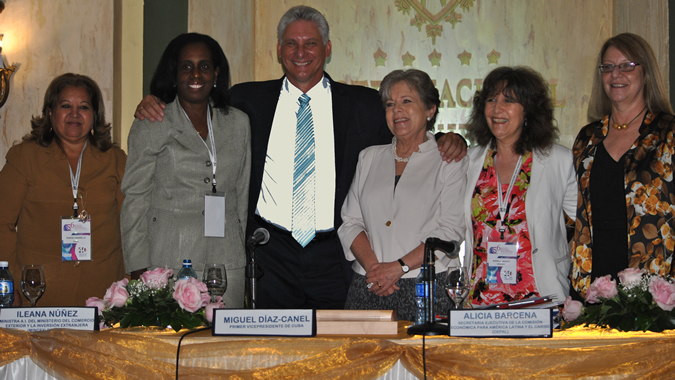Commemoration in Havana of 40 Years of Advancement of Women’s Equality and Rights in the Region with a Focus on Pending Challenges
Work area(s)
Miguel Díaz-Canel Bermúdez, First Vice President of the Councils of State and Ministers of Cuba, and Alicia Bárcena, ECLAC’s Executive Secretary, led the inauguration of the Fifty-Sixth Meeting of the Presiding Officers of the Regional Conference on Women.

Government authorities, international officials and representatives of civil society in Havana, Cuba today looked back on the policies in favor of gender equality and women’s rights implemented over the past 40 years in the countries of Latin America and the Caribbean, which make up the Regional Gender Agenda, and debated the main challenges that lie ahead.
This Thursday, October 5, the Fifty-Sixth Meeting of the Presiding Officers of the Regional Conference on Women in Latin America and the Caribbean was inaugurated at the Hotel Nacional de Cuba. It was organized by the Economic Commission for Latin America and the Caribbean (ECLAC) and the government of Cuba, through the Federation of Cuban Women.
The ceremony was led by Miguel Díaz-Canel Bermúdez, First Vice President of Cuba’s Councils of State and of Ministers; Alicia Bárcena, Executive Secretary of ECLAC; Mariella Mazzotti, Director of the National Women’s Institute (INMUJERES) of Uruguay, in her capacity as Chair of the Presiding Officers of the Regional Conference on Women; and Teresa Amaralle, Member of the Council of State and Secretary General of the Federation of Cuban Women.
Miguel Díaz-Canel Bermúdez welcomed those present, underscoring the Cuban government’s long history of commitment to gender equality, the central role it has played in the political project of the Cuban revolution and the firm foundations this has contributed to the country’s development and culture of rights expansion.
Alicia Bárcena said that “Forty years ago, here in Havana, we started the first crucial chapter of our history. In June 1977, this country hosted the First Regional Conference on the Integration of Women in the Economic and Social Development of Latin America, a turning point in the work for women’s rights and gender equality under the leadership of Vilma Espín.”
The Executive Secretary began her remarks by expressing ECLAC’s solidarity with the Cuban government and people over the devastating effects caused recently by Hurricane Irma on the island.
Mariella Mazzotti emphasized that “the collective process represented by the Regional Conference on Women enabled approval of the Montevideo Strategy and its transformation into a political-technical instrument that recognizes the structural gaps of inequality.”
Bárcena described the Conference – which in 2000 became known as the Regional Conference on Women in Latin America and the Caribbean – “as a meeting place, for dialogue and agreement among different stakeholders,” characterized by “continuity” and “innovation.” Concern for gender equality and women’s rights has remained constant throughout the processes of development, she said, but the approach to gender injustice has undergone innovation, giving shape to the three autonomies of women: economic, physical and in decision-making.
In these 40 years, the Regional Conference has become a space for the conceptual development of femicide (which has been included in laws or criminal code reforms in at least 16 countries of the region), as well as for the establishment of dependents’ right to care under the paradigm of co-responsibility, she sustained.
However, “today, in the 21st century, poverty on our continent still has the face of a woman, given that for every 100 men in this condition, there are 118 women unable to rise above the poverty line,” she said.
Moreover, nearly one third of Latin American women (29%) do not manage to generate income and are economically dependent, and nearly half have no ties to the labor market. This is further compounded by challenges related to the wage gap, violence against women and respect for sexual and reproductive rights, among others.
“When we speak of not leaving anyone behind, let us be clear. Those who lag behind today look like a young woman, with little education, rural, probably indigenous or Afro-descendent and kept from exercising her sexual and reproductive rights,” Bárcena stated.
During the meeting, special attention was given to the Montevideo Strategy for Implementation of the Regional Gender Agenda within the Sustainable Development Framework by 2030, approved at the XIII Conference in 2016, as a roadmap for advancement towards equality, sustainability and the full guarantee of rights. “The Strategy is a tool for planning in complex and uncertain scenarios, to overcome obstacles that limit the scope of public policies,” Bárcena summed up.
At the meeting – which ends Friday and was attended by female ministers and senior authorities from mechanisms for women’s advancement, international officials and representatives of civil society – homage was paid to Vilma Espín, the first President of the Federation of Cuban Women and President of the First Regional Conference.
Related content
Opening of the fifty-sixth meeting of the Presiding Officers of the Regional Conference on Women in Latin America and the Caribbean
Remarks by Alicia Bárcena, Executive Secretary of ECLAC (in Spanish).
Subregional headquarter(s) and office(s)
Country(ies)
- Latin America and the Caribbean
-
Cuba
Contact
Public Information Unit
- prensa@cepal.org
- (56 2) 2210 2040
